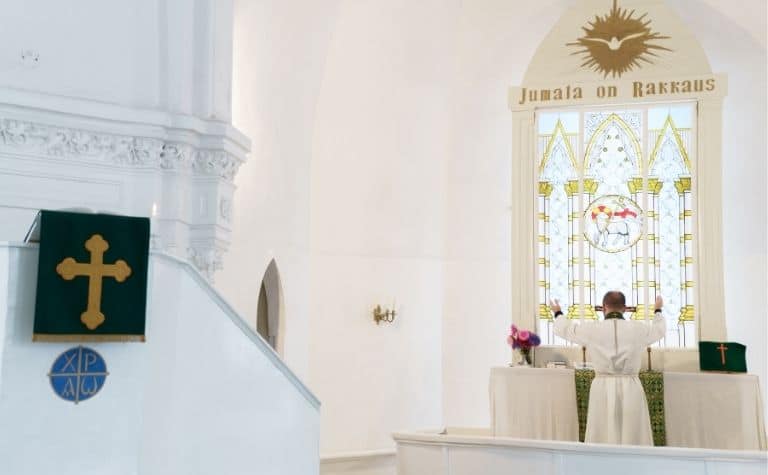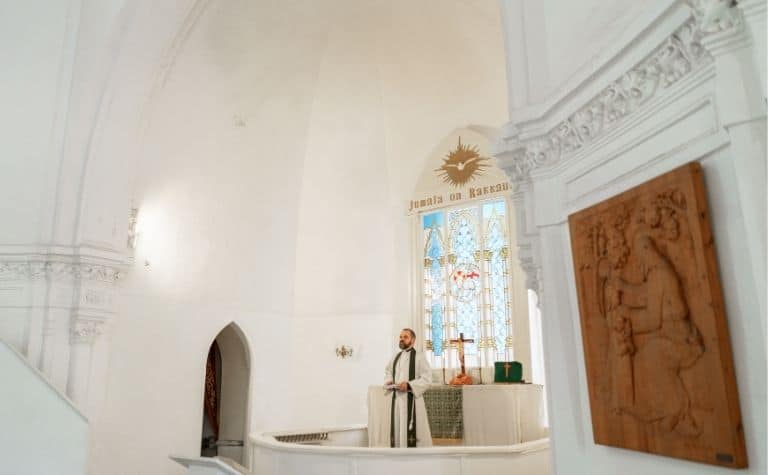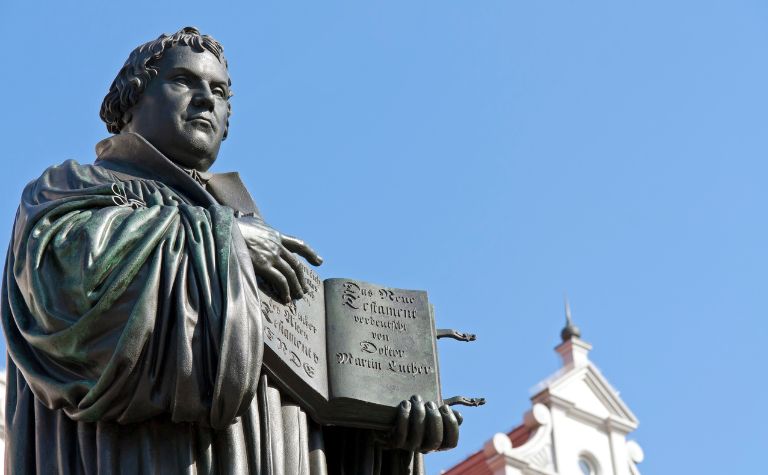The Lutheran tradition is a prominent branch of the Christian faith. Born out of the life and ministry of German Reformer Martin Luther (1483-1546) and the abuses he protested in the Catholic church, Lutheranism has similarities and differences with Catholicism.
Lutherans don’t refer to their clergy as “priests.” Lutheranism teaches that there are better titles that reflect the New Testament’s teaching on the topic, such as “pastor” or “minister.” The tradition is also intent on distinguishing between Catholic beliefs and practices regarding clergy.
What’s wrong with calling clergy “priests” according to the New Testament from the Lutheran perspective? What exactly do “pastor” and ” priest” mean, and how is the term used in the New Testament? What did Martin Luther teach about the priesthood of all believers? Keep reading to learn more.
Also, see What Do Lutherans Believe? to learn more.

What’s the Difference Between a Pastor and a Priest?
The difference between the terms “pastor” and “priest” is partly based on the New Testament meaning of each word and partly on how people have used them in Christian history. (Also see Do Lutheran Clergy Wear Collars?)
Many Protestants, including some Lutherans, avoid using the name “priest” because of its widespread use in Roman Catholicism. [1] Others believe that the title “priest” isn’t the best description, according to the teachings of the Apostles Paul and Peter.
| Pastor | Priest | |
|---|---|---|
| Used in the New Testament? | Yes (e.g., Jer. 10:21), though many translations render the word “shepherd”; “pastor” doesn’t have the same meaning as in the New Testament | Yes, it describes Christ in Heb. 9 and Christians in general (e.g., 1 Pet. 2:9, Rev. 1:6); Greek: presbyteros, meaning “elder”; some churches refer to this office as “bishop,” and some churches refer to bishops as “priests” |
| Used in the Old Testament? | Rare; it’s possible that some Lutherans use the term like it’s used in the Anglican/ Episcopalian tradition. However, it’s mostly avoided in part to make a distinction between Lutheran and Catholic beliefs about the nature and role of clergy. | Yes, hundreds of occurrences; those that defend the use of the name today argue that there is an overlapping purpose to the nature of the role, even if certain practices (e.g. animal sacrifices) are obsolete |
| Churches that use the term today | Yes (e.g., Jer. 10:21), though many translations render the word “shepherd”; “pastor” doesn’t have the same meaning as in the New Testament. | A primary name for clergy in the Catholic tradition, along with “Father”; Anglican/ Episcopalian is the only Protestant tradition that commonly uses the name, though historically it’s emphasized that they use it as a synonym for “elder” |
| Use in Lutheranism | Commonly, in the Lutheran tradition, the English word “pastor” accurately describes the New Testament’s description of those who shepherd congregations. | rare |
| Use in Catholicism | Rare | Common |
What would happen if someone addressed a Lutheran minister as a “priest”? First, it’s unlikely that a minister would be offended if someone called them a priest, but it may signal to them that the person is new to Lutheranism or church.
Second, some pastors may use the occasion to teach why it’s not common to call clergy “priests” in the Lutheran tradition. (Also see What do Lutherans Believe About Mary?)
What would happen if someone addressed a Catholic priest as a “pastor”? Usually, no one would correct the speaker because “pastor” is within the acceptable semantic range for Catholic clergy.
Some priests, however, may prefer to be addressed with a more conventional title in the Catholic church, like “father.”
Also, see Lutheran vs. Reformed: What’s the Difference? to learn more.

Do Pastors and Priests Have Different Roles In a Church?
The names “pastor” and “priest” have overlapping definitions. However, the theological implications of the terms have significant and stark differences. The debate hinges on the nature of the clergy as an intercessor between God and people.
These differences relate to but aren’t limited to, the doctrines of the Atonement of Christ, the intercession of the Holy Spirit, the sanctification of the believer, and the church’s role in administering baptism and communion.
| Pastor | Priest | |
|---|---|---|
| Gender | Traditionally refers to men, though today, the term could describe a man or a woman. | The term only describes men |
| Marriage | Protestant clergy, including Anglican priests, can marry | Catholic priests are unmarried and celibate |
| Education | Many go to seminary and earn a 2 to 4-year degree, but it’s not uncommon for pastors to have less than a Master’s degree. | Preparation to be a Catholic priest can take up to 10 years |
| Ordination | Not required to be a pastor | Required to be a priest |
| Work | Sunday services are emphasized, but Wednesday and Sunday evening services aren’t uncommon; communion is offered routinely, but how often varies by tradition and church | Sunday services are emphasized, but a daily Mass with the Eucharist is offered |
| Confession | Often between 30-60 minutes, depending on the preacher and the church, sermons are often seen as the centerpiece of the service. | Formal and frequent |
| Sermon | Sermons or homilies are often less than 30 minutes; the Eucharist is the centerpiece of the service. | Often between 30-60 minutes, depending on the preacher and the church, sermons are seen as the centerpiece of the service. |
| Wardrobe | Some traditions have clerical attire; others wear suits and ties; others wear jeans, shorts, polo shirts, Hawaiian shirts, flip-flops, etc. | Clerical attire |
| Authority | Ecclesiastical oversight; doesn’t share in the authority of Christ in the life of believers | Ecclesiastical oversight; shares in the authority of Christ in the life of believers |
Also, see Can Lutherans Dance? to learn more.

What did Martin Luther Believe About Priests?
Luther identified many cases of abuse in the Catholic church in the 16th century, especially in the priesthood. His teaching and writing include comments and criticisms about the excess, corruption, and sin he observed in the office. (Also see Do Lutherans Drink Alcohol?)
The prideful, worldly, selfish men in the priesthood disturbed Luther greatly. In response, he sought to recover the doctrine of the priesthood of all believers.
One church historian describes Luther’s convictions this way, “Luther needed to retrieve the doctrine of the priesthood of all believers because, from the third century onwards, a gulf had opened between ordained and lay people, until it reached something of a chasm in the sixteenth century.”
He continues, “This gap between the spiritual world and temporal world de-sanctified the earthly realm and created a chasm between the two, exalting the spiritual world over the temporal world.” [3]
Luther rejected the division between clergy and laity that the Catholic church taught. He believed the doctrine was a tool for clergy to live how they wanted to the detriment of congregants.
Luther wrote, “It is pure invention that pope, bishops, priests, and monks are to be called the ‘spiritual estate; princes, lords, artisans, and farmers the ‘temporal estate.’ [On the contrary] . . . all Christians are truly of the ‘spiritual estate,’ and there is among them no difference at all but that of office.” [3]
For Luther, the clergy’s primary role is to teach Scripture to people and serve according to its instructions. Scripture is for all people, and Luther believed that clergy had an essential role in helping them understand what it means and how to apply it. (Also see Do Lutherans Pray the Rosary?)
Clergy should also serve people according to Scripture’s teachings, not church tradition.
Administering baptism and communion are central to clergy responsibilities, according to Luther. (Also see Here Is the Lutheran View on Marriage and Clergy?)
References:
[1] Source
[2] Source
[3] Source
Related Questions
The Lutheran and Episcopalian traditions have profoundly impacted Protestant Christianity in Europe, the United States, and worldwide. Yet, these two branches of the Christian faith have similarities...
The Lutheran tradition is a 500-year-old branch of Protestant Christianity. Non-denominational churches are a fast-growing segment of evangelical Christianity, especially in the United States and...
